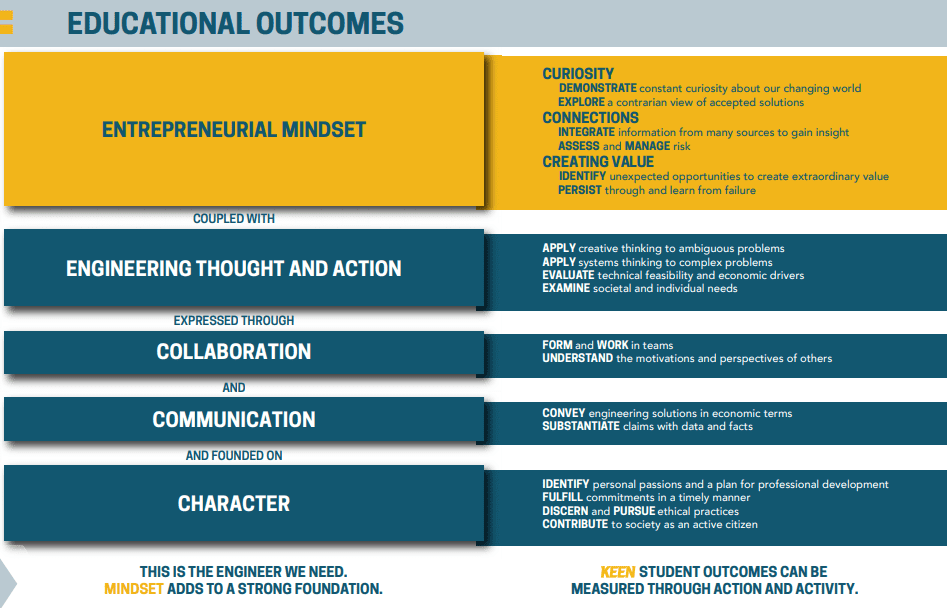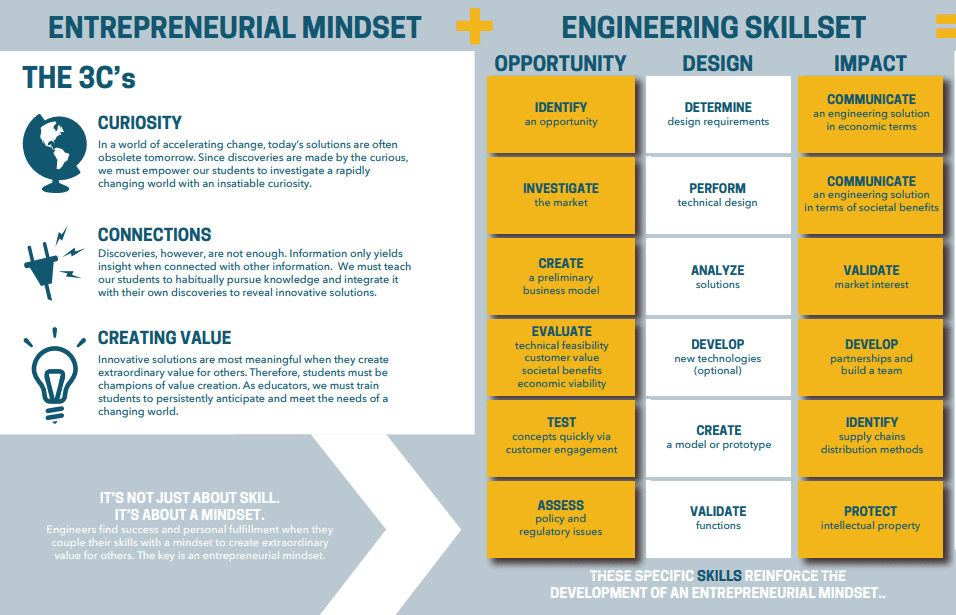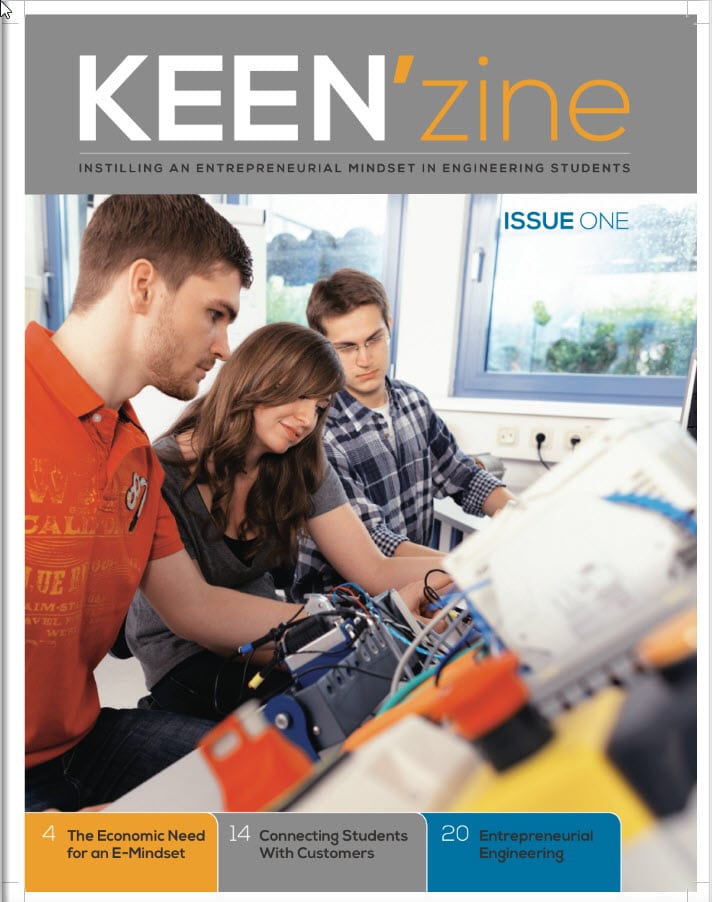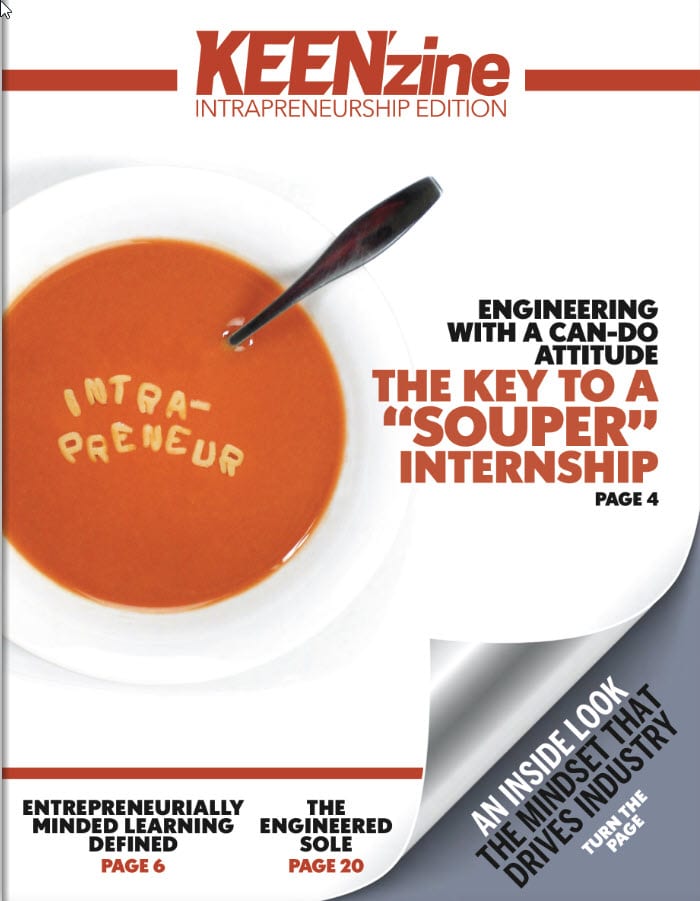Engineering Unleashed
-
Integrating entrepreneurship into engineering education: The KEEN network promotes the integration of entrepreneurial thinking into engineering education. This means teaching students how to identify opportunities, take calculated risks, and innovate.
-
Developing an entrepreneurial mindset: The KEEN network helps students develop an entrepreneurial mindset by promoting a growth mindset, encouraging creativity and innovation, and teaching students to be adaptable and flexible.
-
Fostering collaboration: The KEEN network encourages collaboration among faculty members, students, and industry partners. This collaboration can help students gain real-world experience, build a network of contacts, and develop practical skills.
-
Providing resources and training: The KEEN network provides resources, tools, and training to help faculty members and students integrate entrepreneurship into engineering education. This includes workshops, webinars, and access to a network of experts.
-
Emphasizing experiential learning: The KEEN network emphasizes experiential learning, which involves hands-on, project-based learning. This approach can help students gain practical skills and experience, and develop a portfolio of work that can be used to showcase their abilities to potential employers.
-
Encouraging social responsibility: The KEEN network encourages students to consider the social and ethical implications of their work. This means teaching students to think about the impact of their work on society and the environment, and to develop solutions that are sustainable and responsible.
In her book “Mindset: The Psychology of Success,” Carol Dweck explores the concept of mindset and its impact on personal growth and achievement. Dweck distinguishes between two fundamental mindsets: the fixed mindset and the growth mindset.
The fixed mindset is characterized by the belief that our abilities and intelligence are fixed traits, essentially unchangeable. Individuals with a fixed mindset tend to see success as a validation of their innate abilities, while failure becomes a reflection of their shortcomings. They avoid challenges to protect their sense of self-worth and often give up easily in the face of obstacles. Examples of a fixed mindset can be observed when someone believes that their intelligence is predetermined and unchangeable, or when they think they are “good” or “bad” at certain skills naturally and cannot improve.
On the other hand, the growth mindset is the belief that intelligence and abilities can be developed through dedication and effort. Those with a growth mindset see challenges as opportunities for growth and learning, embracing the idea that failures are merely stepping stones on the path to success. They view effort and perseverance as essential components of achievement. An example of a growth mindset can be seen when someone believes that through practice and learning, they can become better at a skill or subject.
Dweck emphasizes the importance of adopting a growth mindset in various aspects of life, such as education, relationships, and personal development. In education, students with a growth mindset take on challenges and embrace feedback to improve their skills and knowledge. They see mistakes as opportunities for learning and view setbacks as temporary obstacles. In relationships, individuals with a growth mindset recognize that personal qualities and skills can be developed over time, fostering resilience and adaptability in their interactions with others. In personal development, the growth mindset enables individuals to embrace change, take risks, and continuously learn and grow.
Dweck’s research shows that those who embrace a growth mindset tend to achieve greater success and satisfaction in life. They are more motivated and resilient in the face of challenges, as they see setbacks and failures as opportunities for growth. Additionally, individuals with a growth mindset are more likely to develop resilience and perseverance, allowing them to bounce back from setbacks more quickly and effectively.
Conversely, individuals with a fixed mindset may limit their potential and hinder personal growth. They may avoid challenges and feedback due to fear of failure or embarrassment. Their beliefs about the fixed nature of their abilities may create self-fulfilling prophecies, leading to a lack of progress and missed opportunities.
In summary, Dweck’s book “Mindset: The New Psychology of Success” highlights the significance of adopting a growth mindset for personal growth and achievement. The growth mindset allows individuals to embrace challenges, believe in the power of effort and perseverance, and see failure as an opportunity for learning and improvement. By embracing a growth mindset, individuals can overcome limitations, achieve greater success, and cultivate a lifelong love of learning and development.
Click on one of the 5-image slideshow to view a digital flipbook.
Here are the student and faculty testimonials about the entrepreneurial mindset. You need to scroll down to get to the faculty playlist.
Helpful Links on IEEE Entrepreneurship
Source: IEEE Potentials, May/June 2021, Vol 40, No. 3
- Ken Stauffer, 2020 Chair, IEEE Entrepreneurship Steering Committee and IEEE Senior Life Member: https://entrepreneurship.ieee.org/speaker/ken-stauffer
- IEEE Entrepreneurship portal: https://entrepreneurship.ieee.org
- IEEE Entrepreneurship on Facebook: https://www.facebook.com/ieeen3xt/
- IEEE Entrepreneurship on Twitter: https://twitter.com/ieeeENT
- IEEE Entrepreneurship on Linkedin: https://www.linkedin.com/company/ieeeentrepreneurship
- IEEE Entrepreneurship newsletter: https://entrepreneurship.ieee.org/newsletter-archive/
- IEEE Entrepreneurship Exchange community on Collabratec: https://ieee-collabratec.ieee.org/app/community/66/IEEE-Entrepreneurship-Exchange/activities
- IEEE.tv IEEE Entrepreneurship channel: https://ieeetv.ieee.org/channels/Entrepreneurship
- United Nations Social Development Goals: https://sdgs.un.org/goals
- Samantha Snabes: https://entrepreneurship.ieee.org/speaker/samantha-snabes
- IEEE Entrepreneurship Video Library: https://entrepreneurship.ieee.org/video-library
- Resources for local entrepreneurial communities: https://entrepreneurship.ieee.org/2020_10_14_resources-local-communities
- Contact Us: https://entrepreneurship.ieee.org/about/contact-us/
- IEEE Communications Society: https://www.comsoc.org
- IEEE Computer Society: https://www.computer.org/








